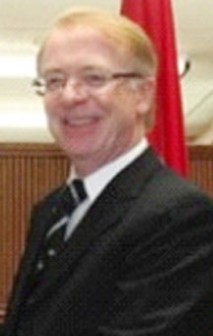The imminent commencement of exploitation activities in Guyana’s commercially viable petroleum basins places the country on the verge of realizing significant economic opportunities, Canadian High Com-missioner David Devine said.
But he stressed the importance of the country preparing “for the necessary steps that this bonanza will bring that will be shared by all sectors of the society.”
The High Commissioner’s comments were made at last Monday’s seminar organised by the Canadian High Commission in Georgetown which saw exchanges between local government officials and high-level functionaries from Canada’s Newfoundland and Labrador Offshore Petroleum Board (C-NLOPB) on the subject of preparing for offshore energy resources.

“As a partner to Guyana, Canada stands willing to provide assistance through valuable technical support to government and the private sector … as the country prepares itself to become a major regional oil and gas producer,” the High Commissioner said.
The visiting C-NLOPB team included its Chairman and Chief Executive Officer Max Ruelokke, International Specialist on Canada’s Atlantic Regulations Frederick Way, Chief Environmental Officer Frank Smyth and Chief Safety Officer Dan Chicoyne.
With several Canadian companies already involved in oil and natural gas exploration activities in Guyana, the visit by the entity’s top executives provides yet another indication of Canada’s interest in playing a pivotal role in the economic exploitation of the local energy sector.
But according to Devine, while the vast reserves of oil and gas present in Guyana’s offshore regions represent the promise of a better future for all Guyanese, the challenges that inhere in realizing the potential as large and as diverse as petroleum production “is as immense as the opportunity itself” and too many times citizens have seen their hopes of a better life go unrealized “when governments fail to plan ahead and institute the necessary regulatory models and fiscal framework that ought correctly to attend the industry.”
According to the Canadian envoy the exploitation of Guyana’s energy reserves will generate increases in revenue that will provide funding for capital works, while the energy sector itself will create a broad spectrum of jobs. There will also be opportunities for training in the skills associated with the industry. He said that the new skills range would include the maintenance of oil extraction rigs and machinery and competencies in the use of specialized communication equipment in addition to various downstream enterprises that will provide services to the energy sector.
Canada’s continued involvement in the local energy sector is to be intensified in the new year with the visit here of a delegation comprising Canadian business owners seeking joint venture partnerships in the development of energy-related downstream industries, while in June next year Devine will accompany a local delegation to Newfoundland and Labrador where the visitors will see first-hand how the various industries there have benefited from the petroleum sector.
Last Monday’s seminar was attended by Prime Minister Samuel Hinds who, in his presentation, reiterated the importance of creating a regulatory framework for a petroleum industry pointing to the dangers of the creation of an environment that was ripe for rampant graft and corruption and the failure to realize anticipated social and economic development in the absence of such a framework. “We are at the beginning of a learning curve and with Canada’s participation in the process Guyana can overcome the challenges and avoid social disorientation along with certain politico-economic destabilizing circumstances,” the Prime Minister said.
The visit here this week by the delegation from the Newfoundland and Labrador Offshore Petroleum Board points to Canada’s drive to further cement its investment interests in Guyana already evidenced in the oil exploration pursuits of the Canadian firm CGX which has already sunk around Cdn$200 million into its offshore oil exploration venture. Canadian interests in mineral exploration in Guyana has seen the presence here of more than 25 firms including Sandsprings Resources Ltd which has signed a US$700 million mineral exploration agreement with Guyana that is likely to produce around 250,000 ounces of gold annually for the next 17 years. At a seminar hosted by the Guyana Manufacturing and Services Association (GMSA) earlier this month the Canadian High Commissioner said that Canada’s economic exploration pursuits in Guyana can increase threefold over the next few years. He envisages that partnerships between Guyana and Canada in the oil and gas sector will witness the significant transfer of technology, expertise and information to Guyana.
The Canada’s Newfoundland and Labrador Offshore Petroleum Board has responsibility for ensuring the environmentally sound pursuit of offshore oil and gas activities. Its Operations and Safety Department undertakes assessments of the potential effects of environmental conditions on the safety of operations. The board reviews proposals for all offshore physical activities including seismic surveys to production projects with a view to identifying their potential effects upon the natural environment or upon other users of that environment. This activity includes reviewing operators’ contingency plans for environmental emergencies such as oil spills in order to ensure that adequate response measures, people and equipment are in place in the event of an accident.





